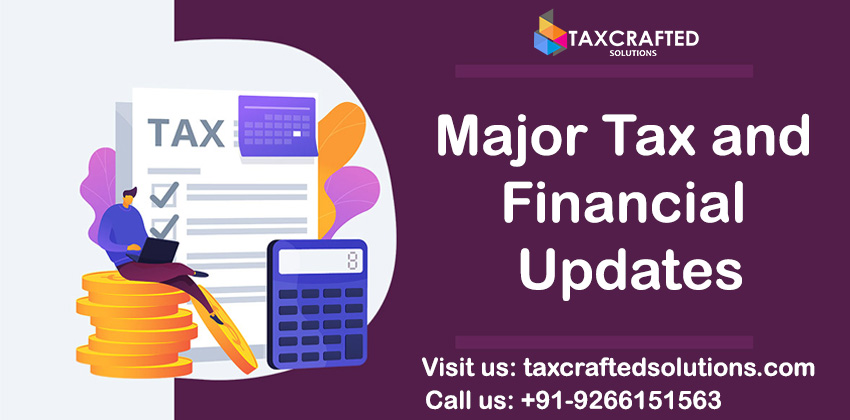
Major Tax and Financial Updates Take Effect on March 1, 2025
As the 2025-26 financial year approaches, several important regulatory and financial changes will take effect from March 1, 2025. These updates will impact taxpayers, businesses, investors, and consumers, covering areas such as Income Tax, GST, e-Way Bill, SEBI Regulations, and Banking.
Below is a comprehensive list of key changes and compliance deadlines to ensure a seamless transition into the new fiscal year.
" Tax laws evolve to create a more streamlined and transparent financial system. Staying updated ensures compliance and financial efficiency. "
1. E-Way Bill Requirements for Unregistered
- Using Form ENR-03, which is accessible on the e-Way Bill portal, unregistered individuals can now create an e-Way Bill.
- Individuals and organizations engaged in the movement of commodities but not registered under GST will benefit from this reform.
2. Introduction of the New Income Tax Bill 2025
- The proposed Income Tax Bill 2025 is presently being reviewed and approved.
- It would supersede the Income Tax Act of 1961 once it is passed, introducing updated tax regulations to streamline compliance and enhance tax administration.
3. Finance Bill 2025 – Key Taxation Changes
A number of significant tax changes will be brought about by the Finance Act 2025, which will soon be passed as the Finance Bill 2025:
- Increased Income Tax Exemption Limit: Under the new tax system, taxpayers earning up to ₹12 lakh will no longer be subject to income tax (New Slab Rate).
- Updates to TDS and TCS Thresholds: Businesses that engage in high-value transactions will be impacted by changes to several TDS (Tax Deducted at Source) and TCS (Tax Collected at Source) restrictions.
- No TCS on Sale from 1 April 2025
- Changes in Self-Occupied House Property Rules
- Rebate & Marginal Relief Changes
- New Deduction Under NPS "Vatsalya" (Section 80CCD(1B)): National Pension Scheme (NPS) assets will be eligible for additional tax benefits.
- Revised Turnover & Investment Limits for MSMEs
- Extension of the Time Frame for Filing Updated Income Tax filings: In order to provide taxpayers additional time to amend previous filings, they can now file updated income tax returns up to 48 months after the conclusion of the assessment year.
4. GST Updates Effective from March 1, 2025
- Negative Liability in GSTR-3B: This feature allows businesses to record negative liabilities in GSTR-3B, which increases the accuracy of GST returns.
- Choosing and Verifying HSN Codes in GSTR-1 and GSTR-1A:
- To minimize errors, a drop-down menu is used in place of manual entry of HSN codes.
- To ensure more transparent reporting, Table 12 has been divided into B2B and B2C transactions.
- Incorrect values will result in first validation warnings, but filing will not be blocked.
" A structured approach to tax audits can help businesses minimize financial risks and maximize compliance benefits. "
5. The 2017 CGST Rules' Rule 8 on the New GST Registration Process
More stringent authentication procedures are now part of the GST registration process:
For candidates who choose not to use Aadhaar authentication:
- A GST Suvidha Kendra (GSK) must be visited in order to take pictures and verify documents.
Regarding Biometric Verification for Aadhaar Authentication:
- For biometric authentication, promoters and partners need to come to GSK.
- Only document verification is required if it has already been confirmed in another State or UT.
Application Reference Number (ARN) non-generation:
- The ARN won't be generated if verification isn't finished in 15 days.
6. Important Dates for GST and Tax Compliance Before March 31, 2025
- Letter of Undertaking, or LUT Renewal: To export tax-free, submit Form GST RFD-11 by March 31, 2025.
- Composition Scheme Enrollment: To choose the Composition Scheme, submit Form CMP-02 by March 31, 2025.
- Choose the QRMP Scheme: Complete the Quarterly Return Filing by April 30, 2025, or opt out.
- GTA Taxpayers: Please submit Annexures V and VI by March 31, 2025.
- GST Refund for FY 2022–2023: Before March 31, 2025, submit a claim for any outstanding GST refunds.
- E-invoicing will be required starting on April 1, 2025: Have e-invoicing ready if your turnover surpasses ₹5 crore.
- GST Amnesty Scheme under Section 128A: Pay taxes owed by March 31, 2025, to receive exemption from GST penalties.
7. Updated SEBI Nomination Guidelines
- By March 31, 2025, all holders of trading and demat accounts are required by SEBI to either designate a beneficiary or opt out.
- Account freeze will result from noncompliance, which will limit trading and investment activity.
" Adapting to tax reforms is not just about compliance; it's an opportunity to enhance financial efficiency and long-term profitability. "
8. Changes in Interest Rates for Fixed Deposits (FD)
- FD interest rates have been revised by major banks as of March 1, 2025.
- Investors who want to match their savings with their financial objectives should evaluate the new rates.
Conclusion
With the new tax and financial regulations taking effect from March 1, 2025, individuals and businesses must take proactive steps to comply and optimize their financial strategies. Whether it’s expert financial planning, professional assistance ensures smooth adaptation to these changes. Partnering with the Best Tax Consultant Company in Delhi helps in navigating the evolving financial landscape effectively.
Stay ahead of the curve, plan wisely, and make informed financial decisions to maximize benefits under the new tax regime!






